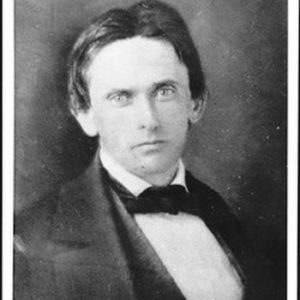
Benjamin Ignatius Hayes
*Benjamin Hayes was born on this date in 1815. He was a white-American pioneer, lawyer, and judge.
Benjamin Ignatius Hayes was born in Baltimore, Maryland, and graduated from St. Mary's University. On November 16th, 1848, in St. Louis, Missouri, to Emily Martha Chauncey of Harford County, Maryland, and in 1849, he "set out from Independence, Missouri, for California, riding one mule and leading another packed with supplies for the trip."
He joined a train of pioneers and reached a Mormon settlement near San Bernardino, California, in January 1850. He stopped again at Mission San Gabriel, the "pueblo of Los Angeles," on February 3rd; he returned to San Gabriel, sold his mules, and returned to stay in the pueblo. Hayes was joined by his wife Emily late in 1851, traveling "by packet to New Orleans, thence by steamer to Panama, which she crossed side-saddle on a mule, then by steamer to San Diego."
After she died in 1857, Hayes helped bring the Sisters of Charity to Los Angeles to establish a hospital. Along with others, he organized a committee to develop the hospital, which was the forerunner to today's St. Vincent Medical Center (Los Angeles). Two of his sisters moved to Los Angeles as well. They were Helena, "the mother of Fred Eaton, one of the city's mayors, and Louisa, the first public school teacher. Hayes was married twice; his second marriage was to Adelaida Serrano on August 2nd, 1866, in San Diego, California. He had two children, John Chauncey and Mary Adelaida.
After arriving in Los Angeles, he formed a law partnership with Jonathan R. Scott. He was a member of the Rangers, Los Angeles's first police force, all volunteers. In the first Los Angeles County election on April 1st, 1850, Hayes, a Democrat, was elected county attorney, "a prosecuting office then provided by law," serving until September 1851. In July of the same year, he became the first city attorney in Los Angeles and served until May 1851. In 1852, he was elected the first district court judge to serve Los Angeles, San Diego, and San Bernardino counties.
In 1856, he freed 14 blacks, including Biddy Mason, held in captivity by Mormons in San Bernardino. Hayes held court in English and Spanish; he recorded in his diary that he could read and write Spanish fluently but was not fluent in speaking it. He also found a problem with the lack of law books. He was reelected in 1857. Hayes "journeyed over his district on horseback and later by carriage and the little steamer, Senator. The court he convened in whatever available structure there was." In 1859, the court was held in a dingy, unhealthy old adobe standing at Franklin and Spring streets in Los Angeles.
In his ten years on the district bench, litigation was heavy and essential, and as it has transpired, history-making. Many of Judge Hayes's decisions have taken the test of time and are references before the bar today; Posterity considers him a learned man with a brilliant legal mind. Benjamin Hayes, whose inspiring rulings are still cited in that state's courts, died on August 4th, 1877.